What Is a Pharmacist?
Pharmacists are medication experts involved in all aspects of medicine delivery to patients. They dispense prescriptions, ensure medicines are correct, prevent harmful drug interactions, and counsel patients on using their medications appropriately.
They are responsible for advising patients about medicines, including how to take them, what reactions may occur, and answering questions leading to the best results and quality of life for a particular patient.
Related Blog: A Guide to PGDM in Pharmaceutical Management: Eligibility, Admissions, Fees, Syllabus, Benefits & More
Pharmacist Career Paths
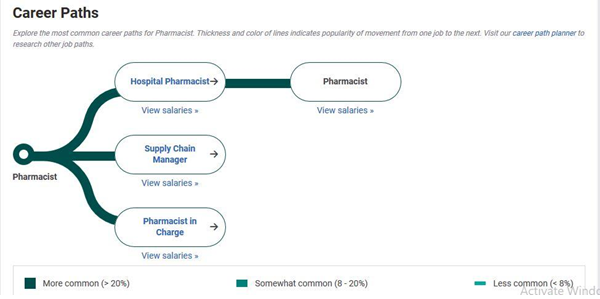
A pharmacy career is diverse and involves numerous opportunities for patient care, scientific research, and innovation. A Pharmacist can work in various medical, retail, administrative, and academic platforms. Those might include:
- Hospital Pharmacist
- Pharmacy Manager
- Informatics Pharmacist
- Compounding Pharmacist
- Hospital Pharmacy Director
- Clinical Pharmacist
- Supply Chain Manager
- Pharmacist In-Charge
Skills & Qualifications for Pharmacist
A Pharmacist requires life-long learning to keep up to date with new drugs and treatments. They also need to have a strong knowledge of legislation and professional codes of practice.
Here are the skills and qualifications required to become a Pharmacist:
- A pharmacist must have enough knowledge regarding their subject to dispense and manage medications and educate patients on the correct usage of drugs and potential drug side effects.
- They must have analytical skills and a keen researcher in pharmacy to stay up-to-date about information regarding the drugs they are dispensing.
- They must be skilled at communicating safety instructions like potential side effects of the drug and giving general advice.
- Pharmacists should follow ethical practice. They should be confidential about patient information.
Pharmacist Duties and Responsibilities
To perform duties and responsibilities, a pharmacist must have a Pharmacy degree providing an understanding of the biochemical mechanisms of drugs, drug uses, therapeutic roles, side effects, potential drug interactions, and monitoring parameters.
Pharmacist duties and responsibilities include:
- Maintaining the quality of medicines supplied to patients.
- Making sure that the supply of drugs is within the law.
- Giving the right advice for medicine prescribed to patients is suitable.
- Consulting patients about medicine intake, what reactions may occur, and answering patients’ questions.
- Supervising the medicines supply chain and ensuring pharmacy premises and systems are fit for the purpose.
Average Pharmacist Salary in India

Here is the rewritten text with some minor changes:
An entry-level Pharmacist with less than one year of experience can expect to earn an average total compensation (including tips, bonuses, and overtime pay) of approximately ₹251,181. A Pharmacist with 1-4 years of experience earns an average total compensation of around ₹269,318. Mid-career Pharmacists having 5-9 years of experience earn a typical total compensation of approximately ₹301,654. Experienced Pharmacists with 10-19 years in the field earn an average total compensation of roughly ₹311,075. Very experienced Pharmacists with 20 or more years can expect to make an average total compensation of about ₹391,074.
Parameters Affect Pharmacist Salary in India
Pharmacists play a significant role in helping patients get the best results from their medications, given their familiarity with the medicinal ingredients and precautions. In addition to filling prescriptions from doctors, pharmacists give appropriate suggestions for each patient and identify any errors by physicians in prescribing medication to patients.
Here are a few key parameters which affect the Pharmacist salaries in India:
1. Experience Affects Pharmacist Salaries in India
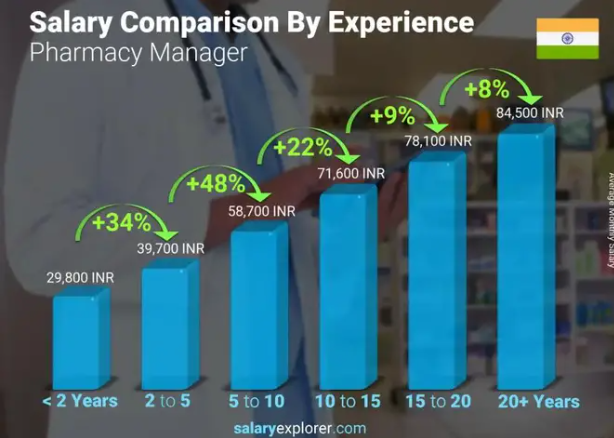
Yes, experience level is the prominent factor in determining the salary. More years of experience means higher wages. An entry-level Pharmacist with less than 02 years of experience can expect to earn an average of ₹29,800/month. A pharmacist with 2-5 years of experience earns an average total compensation of ₹39,700/month. A mid-career Pharmacist with 5-10 years of experience earns an average total compensation of ₹58,700/month. An experienced Pharmacist with 15-20+ years of experience can earn from ₹78,100 – 84,500/- month in India.
2. Skills Affects Pharmacist Salaries in India

Pharmacists should possess skills like Collaborating with other healthcare professionals to plan, monitor, review, and evaluate patient effectiveness. A pharmacist is skilled enough to recommend drug therapy changes when needed. They are qualified to perform simple healthcare procedures like taking your blood pressure and temperature, testing your blood sugar levels, and checking your cholesterol.
Here are the lists of skills that can affect your salary:
- Clinical Research
- Pharmacotherapy
- Oncology
- Operations Management
- Long Term Care
- Pharmaceutical Production
- Inventory Management
- Patient Counseling
- Mail Order Pharmacy
- Oral/Verbal Communication
3. Location Affects Pharmacist Salaries in India
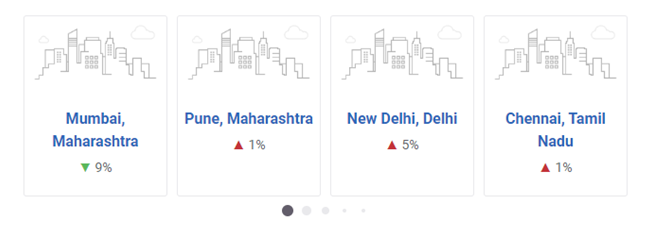
Pharmacists working in New Delhi, Delhi typically earn salaries approximately 4.8% above the nationwide average for their occupation. Job holders with “Pharmacist” in their title also tend to find higher-than-normal pay in Bangalore, Karnataka (4.3% above average) and Pune, Maharashtra (1.1% more). The lowest compensation levels are usually observed in Lucknow, Uttar Pradesh (17.0% under average), Ahmedabad, Gujarat (16.9% less) and Mumbai, Maharashtra (8.5% below average).
4. Pharmacist Salary Comparison by Employer
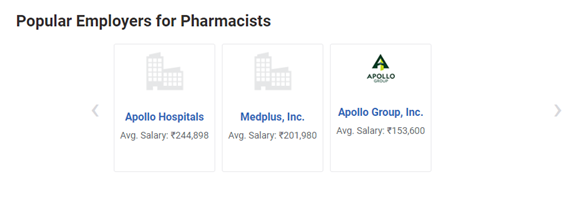
The leading employers represented among job holders with the title of Pharmacist include Apollo Hospitals, Medplus, Inc. and Apollo Group, Inc. Average reported salaries are highest at Apollo Hospitals, where pay averages approximately ₹244,898. Apollo Group, Inc. offers the lowest compensation levels at around ₹153,600.
5. Pharmacist Salary Comparison by Education
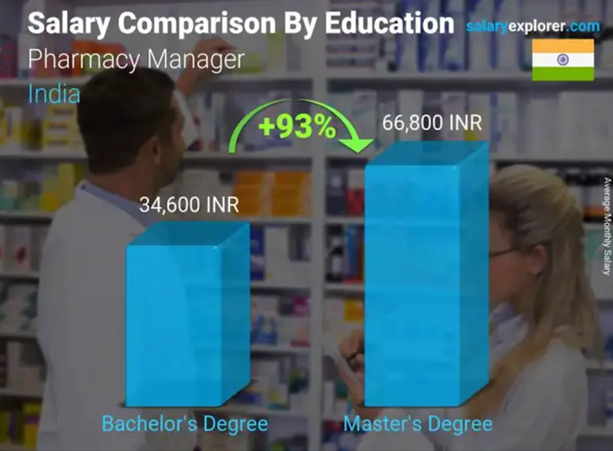
Bachelor’s Degree holders earn 34,600 INR annually.
Master’s Degree holders make 66,800 INR, representing a 93% jump over the previous level.
Is a Master’s Worth It?
Pursuing a Master’s program or MBA in India typically costs between 160,000 INR to 481,000 INR over roughly two years. It’s a major financial commitment.
You likely won’t see any salary increases during your studies if already employed. Pay reviews usually only occur once your degree is complete.
Many pursue higher education to qualify for higher-paying roles. The numbers support this tactic, as average pay when changing jobs is approximately 10% more than typical increments.
If you can manage the education expenses, the return on investment proves worthwhile. Most recoup costs within a year through increased compensation.
6. Pharmacist Salary Comparison by Gender
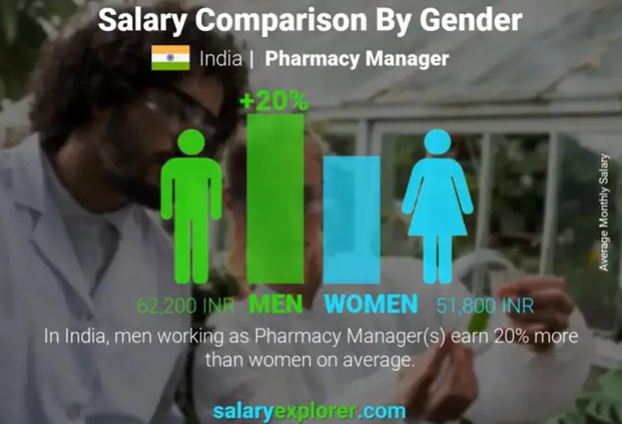
While pay equity should exist regardless of gender, unfortunately reality tells a different story. So which sex tends to earn more – men or women?
For those holding the job title of Pharmacy Manager in India, the typical salary disparity between male and female employees stands at 20%.
The average pay for males in this role is 62,200 INR. For females, compensation is 17% less at 51,800 INR.
7. Pharmacist Salary Comparison by Specialization
Specialized skills, such as knowledge in specific therapeutic areas or expertise in pharmaceutical research, can impact salary levels. Those in clinical roles, working directly with patients, might earn differently from their counterparts in research-focused positions within pharmaceutical companies. Salaries hinge on factors like demand, the complexity of responsibilities, and the institution or company they work for.
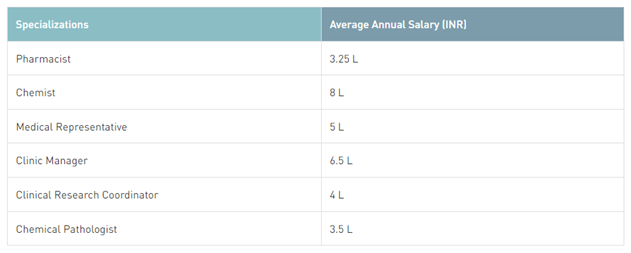
What Are Popular Skills for Pharmacists?
Do you know one of the most underrated yet crucial skills a pharmacist can possess is patient care because, as medical professionals, their top priority is the wellbeing of patients? Pharmacists need to ensure HIPAA compliance to maintain patient privacy. Here are the recommendations that fit your preferences and skills for becoming a Pharmacist and steps to help you stand out to employers:
- Patient Care
- Pharmacy Service
- Customer Service
- Drug Therapy
- Retail Pharmacy
- Pharmacotherapy
- Hospital Education
- Oral/ Verbal Communication
Why Should You Become a Pharmacist?
Pharmacy offers many benefits, and opportunities making it an excellent earning source It is ranked consistently as one of the most highly trusted professions due to the care and service pharmacists provide.
Here are the top reasons why pharmacy is a rewarding career:
- Trusted profession: Due to patient care and health-related services, it is the most trusted profession.
- Excellent Earning Potential and Job Security: Pharmacists are consistently in demand even during economic downturns and the COVID-19 pandemic. Thus it’s become one of the most financially rewarding careers.
- Incredible Growth: There is a wide variety of work settings available on this platform such as Community pharmacies, hospitals, long-term care facilities, the pharmaceutical industry, mail-order pharmacy centres, and government agencies.
Popular Employers for Pharmacists
The pharmaceutical sector in India continues to offer several lucrative job opportunities, boasting diverse career paths within the industry. With a focus on work-life balance, this sector presents flexibility, promising job growth, and competitive salaries. Here are the current top five pharmacy companies actively hiring in India:
Here are the names of the top 10 pharmaceutical companies hiring in India:
- Apollo Hospitals Group
- MedPlus Health Services Pvt. Ltd.
- Cadila Healthcare Ltd (Zydus)
- Cipla Ltd
- Dr Reddy’s Laboratories Ltd
- Sun Pharmaceutical Industries Ltd
- Biocon Limited
- Glenmark Pharmaceuticals Ltd
- Torrent Pharmaceuticals Ltd
- Abbott Laboratories
Pharmacist Salary Distribution in India
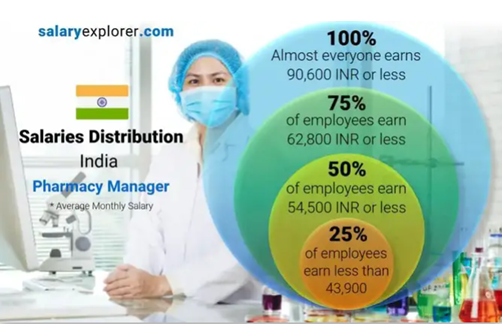
Understanding the distribution of pharmacist salaries in India provides valuable insights into earning potential across the profession.
Here is a breakdown of the key salary metrics:
Salary Range and Starting Salary
Reported salaries for Pharmacy Managers in India span from 26,200 INR at the minimum to 90,600 INR at the maximum. It’s important to note this bottom figure does not represent the legally mandated minimum wage. Rather, it depicts the lowest pay reported through a comprehensive salary survey of thousands of professionals across India.
Median Salary
The median salary stands at 54,500 INR. This denotes half of pharmacy managers earn less and half earn more. The median salary serves as the midpoint of all reported wages. Ideally, one would want to be in the higher-paying half above the median line.
Percentiles and Distribution
Closely linked to the median are the 25th and 75th percentiles. Analysis shows 25% earn less than 43,900 INR while 75% earn above this level. Likewise, 75% take home less than 62,800 INR and 25% exceed this amount.
Pay Scale Structure
To provide clearer expectations, we categorized salaries into bands. This approach offers a more accurate representation than a simple average. Most salaries, around 65%, fall between 32,600 INR to 47,400 INR. Approximately 20% are under 32,600 INR, while 10% range from 47,400 INR to 54,100 INR. Only 5% surpass 54,100 INR.
Average Annual Salary Increment Percentage in India
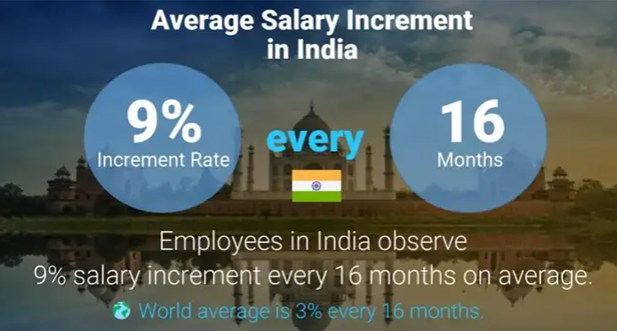
Based on the Salary Budget Planning Report, Indian companies are projecting a salary increase of around 9% in 2024, aligning closely with the 10% rise observed in 2023. It positions India at the forefront of salary increments within the Asia Pacific region. The prospect of Indian companies offering the most significant salary increases in the region in 2024, despite the global economic slowdown, signals a positive outlook for both the Indian economy and its workforce.
Indian Pharmaceutical firms will likely give an average salary hike of 9% in 16 months.
Pharmacist Bonus and Incentive Rates in India
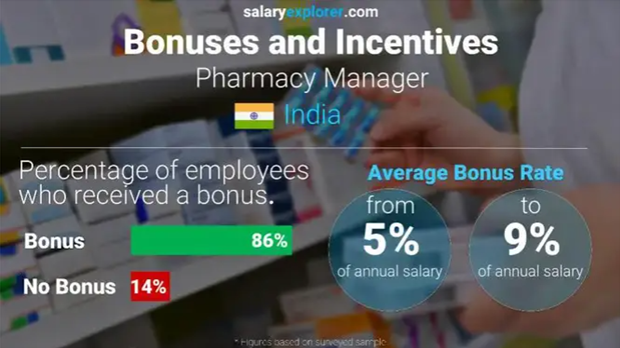
The survey found that 14% of respondents indicated they had not received any bonuses or incentives in the previous year. Meanwhile, 86% stated they had obtained at least one type of monetary bonus.
Those who did receive bonuses reported the amounts ranging from 5% to 9% of their annual salary.
The breakdown was: Received bonus – 86%, No bonus – 14%
Pharmacist Salary Comparison: Country Wise
Comparing pharmacist salaries across different countries provides insights into the global landscape within the pharmaceutical field. Salaries for pharmacists vary significantly worldwide due to factors like economic conditions, healthcare systems, and demand for pharmaceutical expertise.
Countries such as the USA, UK, and Russia stand among the foremost medicine manufacturers globally, leveraging advanced technology and cutting-edge medicinal practices. As a result, Pharmacists’ salaries in these nations significantly surpass those in other countries.
| Country | Average Annual Salary (INR) |
| USA | ₹89,00,000 |
| UK | ₹45,83,000 |
| Australia | ₹59,95,000 |
| Canada | ₹56,86,000 |
| Germany | ₹36,31,000 |
| Japan | ₹33,26,000 |
| China | ₹41,94,000 |
| Russia | ₹67,88,000 |
Become A Pharmacist with ASM’s COST
Are you wondering about the next professional step?
Choose ASM’s IMCOST to pursue a Post Graduate Diploma in Pharmaceutical Management and unravel your rewarding career opportunities. Learn from the best and develop various soft skills required to build your career. All you have to do is fill out the inquiry form, and our experts will get back to you!




